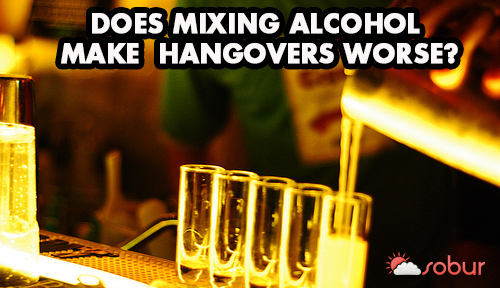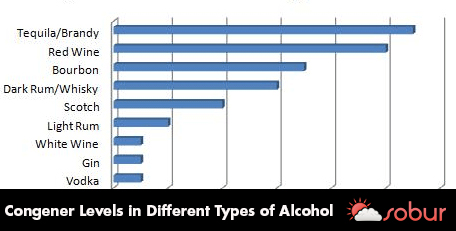
A lot of odd things have been said about mixing booze: “Beer before whiskey, always risky… Whiskey before beer, never fear.” Is there a reason to believe these sayings? Do we, as alcohol fans, really have to watch what we drink first and what we take afterwards?
Mixing Alcohols: The Real Score
Here’s the good news! According to the BBC, mixing different types of alcohol does not result in hangovers. Essentially, it is not the mixing that makes drinkers sick the following day but the quantity, instead. So no matter what order you consume different drinks, it does not really matter.
Stated in a plain and simple way: The degree of a hangover is dependent mainly on the alcohol content of any given drink, the amount taken and the rate at which it is consumed.
Not All Drinks are Created Equal
By rough estimation, the alcohol content in a pint of beer and a shot of tequila is almost the same. It is also important to note that darker drinks contain more congeners, the product of the fermentation process which is responsible for the intoxicating effect of alcoholic drinks. Taking these points into consideration, there is a greater likelihood that you will get drunk faster if you swig down stronger drinks in amounts beyond what is considered safe.
Given that mixing booze does not cause worse hangovers, it’s still not an excuse to consume cocktails with reckless abandon. The more you drink, the higher level of alcohol goes into your system and the bigger the chance of having a bad hangover the following the day.
Congeners: WTF?

Partying all night long does give you a feeling of being on top of the world. But notice how badly you fall into a hangover after soaring too high in your alcohol intoxication. The awful feeling that makes you suffer the morning after binge drinking is partly due to congeners.
Responsible for the deep color in spirits, congeners may vary depending on the type of alcoholic drink. They are sometimes trace elements mixed in drinks to give it flavor or stabilize the drink. Other times, congeners are impurities in spirits. The main point being that congeners have the ability to cause or heighten several symptoms related to hangovers the moment they penetrate your system.
A very effective way to minimize your exposure to congeners is to avoid alcoholic beverages that are darker in color. Examples of spirits that are laden with congeners are bourbon, brandy, whiskey, dark rum and red wine. These are the types that would surely give a bad hangover when you overindulge.
On the contrary, clear drinks like gin, vodka and white rum tend to cause less severe hangovers. This is due to the relatively low levels of congeners present in these drinks.
Those who mix their drinks tend to choose dark-colored varieties with higher levels of congeners. And by virtue of the wide drinking range, they expose themselves to higher levels of congeners as well. Again, don’t blame the mixing of different alcoholic drinks as the root cause of a bad hangover. The real offender could either be due to over-drinking or the high congener count of the cocktail.
Avoiding a Nasty Hangover
When try to understand the biology of a hangover you will most likely hear about troubled sleep, irritated stomach, dehydration and other physiological effects. But there are a few things that you can do to lessen its impact. Before you take in a few drinks, do the following:
- Stay hydrated.
Remember, drink more water, not more booze. Hangover symptoms tend to be worse when your body is dehydrated. You can also employ an effective strategy to set your pace of alcohol consumption. Try to alternate between hard and soft drinks and you will notice a big difference. - Never drink on an empty stomach.
Alcohol is quickly absorbed from the small intestine when you drink without eating something first. But having enough food in your stomach prior to a drinking spree can slow down the rate of alcohol absorption. Take note that the eating should be done BEFORE you drink any alcoholic beverage. On a hangover standpoint, eating after could no longer do much good to your body. - Limit your alcohol intake.
A Hangover is the result of drinking too much alcohol. So the best way to prevent a hangover is to drink in moderation. The recommended safe limits of alcohol differ for men and women.For men, the recommended safe limit of alcohol is no more than 21 units in a week and no more than 4 units per day. It is also highly suggested to have at least 2 days of no alcohol intake at all.
For women, the recommended safe limit is no more than 14 units in a week and no more than 3 units in any given day. And just like men, it is also highly recommended to spend at least 2 days free of alcohol.
It is worth noting that a unit is not as simple as a glass of wine or any other particular drink. The number of units is determined by the strength of the drink and the size of the glass. You can determine the number of units for your drinks using a unit calculator.
If we are to compare the alcohol content on different drinks, it would be clear to see that beer has lesser strength than wine. Because of the varying level in strength, these two types of drinks could have different effects on your judgment. Mixing the two, or other intoxicating drink for that matter, could (probably will) make you drunk as you drink more.
In conclusion, it is not the grain or the grape that you should blame when you suffer a hangover. Rather you are putting yourself in jeopardy because you are no longer able to judge your own drunkenness and you will tend to drink more heavily.

Have You Heard About The “Miracle Hangover Cure” that Wired magazine, New Scientist and the NY Post are all talking about?
It’s called Dihydromyricetin and it will change the way you consume alcohol for ever! Sobur, our hangover cure supplement, uses dihydromyricetin (read more about Dihydromyricetin here) as our key ingredient, along with several other essential ingredients that replenish & restore key vitamins and minerals the body looses when you drink alcohol.
Check Out Sobur Hangover Cure Today…
References:
[1]http://recipes.howstuffworks.com/which-drinks-give-you-the-worst-hangovers.htm
[2]http://www.bbc.com/future/story/20140428-does-wine-beer-huge-hangover
[3]http://theconversation.com/mondays-medical-myth-mixing-drinks-causes-hangovers-5055
[4]http://www.patient.co.uk/health/Recommended-Safe-Limits-of-Alcohol.htm
